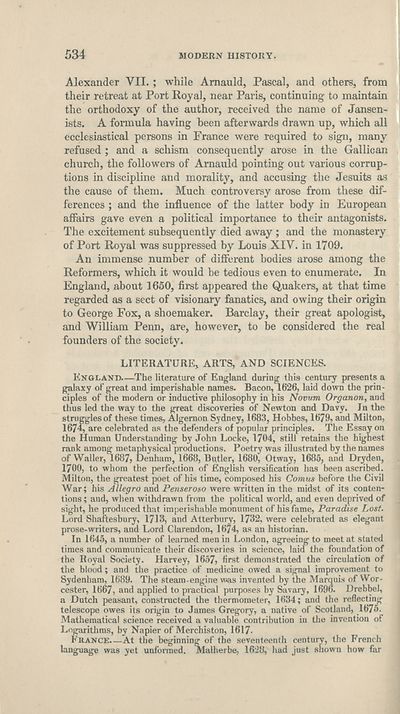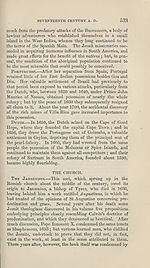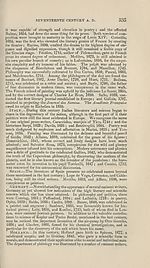Download files
Complete book:
Individual page:
Thumbnail gallery: Grid view | List view

534
MODERN HISTORY.
Alexander VII. ; while Arnauld, Pascal, and others, from
their retreat at Port Royal, near Paris, continuing to maintain
the orthodoxy of the author, received the name of Jansen-
ists. A formula having been afterwards drawn up, which all
ecclesiastical persons in France were required to sign, many
refused ; and a schism consequently arose in the Gallican
church, the followers of Arnauld pointing out various corrup¬
tions in discipline and morality, and accusing the Jesuits as
the cause of them. Much controversy arose from these dif¬
ferences ; and the influence of the latter body in European
affairs gave even a political importance to their antagonists.
The excitement subsequently died away ; and the monastery
of Port Royal was suppressed by Louis XIV. in 1709.
An immense number of different bodies arose among the
Reformers, which it would be tedious even to enumerate. In
England, about 1650, first appeared the Quakers, at that time
regarded as a sect of visionary fanatics, and owing their origin
to George Fox, a shoemaker. Barclay, their great apologist,
and William Penn, are, however, to he considered the real
founders of the society.
LITERATURE, ARTS, AND SCIENCES.
England.—The literature of England during this century presents a
galaxy of great and imperishable names. Bacon, 1626, laid down the prin¬
ciples of the modern or inductive philosophy in his Novum Organon, and
thus led the way to the great discoveries of Newton and Davy. In the
struggles of these times, Algernon Sydney, 1683, Hobbes, 1679, and Milton,
1674, are celebrated as the defenders of popular principles. The Essay on
the Human Understanding by John Locke, 1704, still retains the highest
rank among metaphysical productions. Poetry was illustrated by the names
of Waller, 1687, Denham, 1668, Butler, 1680, Otway, 1685, and Dryden,
1700, to whom the perfection of English versification has been ascribed.
Milton, the greatest poet of his time, composed his Comus before the Civil
War; his Allegro and Penseroso were written in the midst of its conten¬
tions ; and, when withdrawn from the political world, and even deprived of
sight, he produced that imperishable monument of his fame, Paradise Lost.
Lord Shaftesbury, 1713, and A tier bury, 1732, were celebrated as elegant
prose-writers, and Lord Clarendon, 1674, as an historian.
In 1645, a number of learned men in London, agreeing to meet at stated
times and communicate their discoveries in science, laid the foundation of
the Royal Society. Harvey, 1657, first demonstrated the circulation of
the blood; and the practice of medicine owed a signal improvement to
Sydenham, 1689. The steam-engine «>as invented by the Marquis of Wor¬
cester, 1667, and applied to practical purposes by Savary, 1696. Drebbel,
a Dutch peasant, constructed the thermometer, 1634; and the reflecting
telescope owes its origin to James Gregory, a native of Scotland, 1875.
Mathematical science received a valuable contribution in the invention of
Logarithms, by Napier of Merchiston, 1617.
France—At the beginning of the seventeenth century, the French
language was yet unformed. Malherbe, 1628, had just shown how far
MODERN HISTORY.
Alexander VII. ; while Arnauld, Pascal, and others, from
their retreat at Port Royal, near Paris, continuing to maintain
the orthodoxy of the author, received the name of Jansen-
ists. A formula having been afterwards drawn up, which all
ecclesiastical persons in France were required to sign, many
refused ; and a schism consequently arose in the Gallican
church, the followers of Arnauld pointing out various corrup¬
tions in discipline and morality, and accusing the Jesuits as
the cause of them. Much controversy arose from these dif¬
ferences ; and the influence of the latter body in European
affairs gave even a political importance to their antagonists.
The excitement subsequently died away ; and the monastery
of Port Royal was suppressed by Louis XIV. in 1709.
An immense number of different bodies arose among the
Reformers, which it would be tedious even to enumerate. In
England, about 1650, first appeared the Quakers, at that time
regarded as a sect of visionary fanatics, and owing their origin
to George Fox, a shoemaker. Barclay, their great apologist,
and William Penn, are, however, to he considered the real
founders of the society.
LITERATURE, ARTS, AND SCIENCES.
England.—The literature of England during this century presents a
galaxy of great and imperishable names. Bacon, 1626, laid down the prin¬
ciples of the modern or inductive philosophy in his Novum Organon, and
thus led the way to the great discoveries of Newton and Davy. In the
struggles of these times, Algernon Sydney, 1683, Hobbes, 1679, and Milton,
1674, are celebrated as the defenders of popular principles. The Essay on
the Human Understanding by John Locke, 1704, still retains the highest
rank among metaphysical productions. Poetry was illustrated by the names
of Waller, 1687, Denham, 1668, Butler, 1680, Otway, 1685, and Dryden,
1700, to whom the perfection of English versification has been ascribed.
Milton, the greatest poet of his time, composed his Comus before the Civil
War; his Allegro and Penseroso were written in the midst of its conten¬
tions ; and, when withdrawn from the political world, and even deprived of
sight, he produced that imperishable monument of his fame, Paradise Lost.
Lord Shaftesbury, 1713, and A tier bury, 1732, were celebrated as elegant
prose-writers, and Lord Clarendon, 1674, as an historian.
In 1645, a number of learned men in London, agreeing to meet at stated
times and communicate their discoveries in science, laid the foundation of
the Royal Society. Harvey, 1657, first demonstrated the circulation of
the blood; and the practice of medicine owed a signal improvement to
Sydenham, 1689. The steam-engine «>as invented by the Marquis of Wor¬
cester, 1667, and applied to practical purposes by Savary, 1696. Drebbel,
a Dutch peasant, constructed the thermometer, 1634; and the reflecting
telescope owes its origin to James Gregory, a native of Scotland, 1875.
Mathematical science received a valuable contribution in the invention of
Logarithms, by Napier of Merchiston, 1617.
France—At the beginning of the seventeenth century, the French
language was yet unformed. Malherbe, 1628, had just shown how far
Set display mode to:
![]() Universal Viewer |
Universal Viewer | ![]() Mirador |
Large image | Transcription
Mirador |
Large image | Transcription
| Antiquarian books of Scotland > Education > Elements of universal history on a new and systematic plan > (554) |
|---|
| Permanent URL | https://digital.nls.uk/127586788 |
|---|
| Description | Thousands of printed books from the Antiquarian Books of Scotland collection which dates from 1641 to the 1980s. The collection consists of 14,800 books which were published in Scotland or have a Scottish connection, e.g. through the author, printer or owner. Subjects covered include sport, education, diseases, adventure, occupations, Jacobites, politics and religion. Among the 29 languages represented are English, Gaelic, Italian, French, Russian and Swedish. |
|---|

